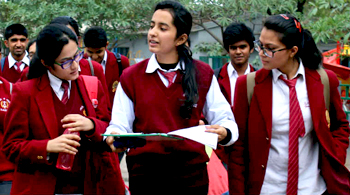New Delhi, Oct 5: The Central Board of Secondary Education (CBSE) has decided to do away with the option for re-evaluation of answer sheets for the Class XII board examinations from 2017.
 The decision was taken in view of the growing number of applications and limited human resource. “We have decided to end the facility from next year,” said CBSE chairman Rajesh Kumar Chaturvedi.
The decision was taken in view of the growing number of applications and limited human resource. “We have decided to end the facility from next year,” said CBSE chairman Rajesh Kumar Chaturvedi.
In 2014, the board began offering re-evaluation option in 12 of the total 187 subjects, including physics, chemistry, mathematics and biology.
It also provided students with an option to apply for a copy of their evaluated answer sheets and challenge the evaluation in up to 10 questions by paying Rs 200 for each.
The re-evaluation option was brought in after the introduction of a new format of the joint entrance examination (JEE), wherein it was decided to be conducted in two parts – JEE Main and JEE Advanced – for admissions to premier technical institutes, including the Indian Institutes of Technology (IITs).
As the nationwide test stipulated that only top 20 percentile holders of each board or those who secure over 75% marks would be eligible for admissions to IITs based on their performance in JEE Advanced, there was a surge in demand for re-evaluation.
“While the number of applications is growing each year, we have very limited manpower to process them. Moreover, it is also not justified to allow re-evaluation in just 12 of 187 subjects. The issue was recently discussed at the board's governing council meeting also. Most of the members supported ending the facility,” a CBSE official said.
The board has also decided to hold the next central teachers' eligibility test (CTET) online. Chaturvedi said that a move has also been initiated to bring more reforms in the examination system and the CBSE's affiliation by-laws, required to give more teeth to the board to take action against schools violating the rules. Chaturvedi said the board has also decided to make the process of verification of class XII board certificates completely online from next year. The board is already sending the mark sheets and other details to the national academic depository.





Comments
If there is no enough man power!! you hire.. and not to play with students life... Of course Students will seek for the high marks and they apply for re-evaluation for their better carrier.. and get merit seat...So, you have to fulfill their request. Do not escape by giving simple reason \NOT ENOUGH HUMAN RESOURCE\""
Add new comment